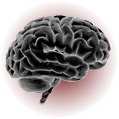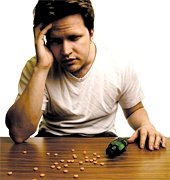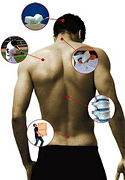What Does Your Pain Tell You?
By Burl Pettibon, DC, FABCS, FRCCM
According to Ben Franklin, "In this world, nothing is certain except death and taxes." Unfortunately, you can add one more troubling reality to that list: pain. We all experience pain at some point in our lives, and we all want to avoid it, of course. If we are in pain, it usually means something bad is happening to our bodies. Pain is nature's signal to tell us, "Pay attention. Your body is being damaged. You need to make an adjustment to heal this damage and prevent it from happening again." It's All Relative When trying to evaluate the level of pain you are in, keep the frog story in mind. What is the frog story? If you drop a frog into boiling water, it will immediately jump out of the pot. However, if you place a frog in a pot of cold water and heat the water gradually, the frog will remain and literally allow itself to cook to death. Perhaps a bit gruesome, but true.
 The same can be said for human beings. A person who is normally not in pain may come into their doctor's office and report they have an ailment with a pain level of "9" on a scale of 1-10. A person who has been dealing with a chronic problem for years may come into the office and report a pain level of "4," even though clinically, they are much worse off than the person claiming to be a "9" and have sustained much more damage to their body. Like the frog, if pain comes on gradually and gets progressively worse, a person may not realize the degree of their physical dysfunction until it's a serious health issue.
The same can be said for human beings. A person who is normally not in pain may come into their doctor's office and report they have an ailment with a pain level of "9" on a scale of 1-10. A person who has been dealing with a chronic problem for years may come into the office and report a pain level of "4," even though clinically, they are much worse off than the person claiming to be a "9" and have sustained much more damage to their body. Like the frog, if pain comes on gradually and gets progressively worse, a person may not realize the degree of their physical dysfunction until it's a serious health issue. You've Got Pain - Now What? One option far too many Americans race toward to deal with pain is over-the-counter and even prescription drugs. There are several reasons for reconsidering this option. First of all, as mentioned earlier, pain is a way for our bodies to tell us, "Hey, you need to fix something; you are harming your body." If you take a drug to temporarily mask the pain, you are ignoring this message and allowing the damage to continue.
 Unfortunately, too much of mainstream health care offers solutions that address the symptom, rather than the cause. Not to mention that any pharmaceutical solution comes with a host of potential side effects. There's no getting around this reality - just read the warning label or insert that accompanies any medication. What's worse, some people get into a harmful cycle of taking pain pills and then taking additional drugs to cover up the side effects of the original drug!
Unfortunately, too much of mainstream health care offers solutions that address the symptom, rather than the cause. Not to mention that any pharmaceutical solution comes with a host of potential side effects. There's no getting around this reality - just read the warning label or insert that accompanies any medication. What's worse, some people get into a harmful cycle of taking pain pills and then taking additional drugs to cover up the side effects of the original drug! In a sense, taking a pill is the easy way to avoid dealing with the pain. It requires no effort whatsoever. Unfortunately, too many people in America find the easiest solution the most attractive. In the real world, that's rarely the best approach. Why Are You Hurting? If you have pain, your first task is to try to discover what your body is telling you. There are many potential sources of your pain. Assuming you aren't suffering from an acute injury (for example, a muscle strain or tear that occurs while working out or lifting a heavy box, etc.), here are some potential pain sources to consider: - Toxic Pain. Your headache may be caused by an increased level of sugar in your bloodstream or some other toxic situation. For some people, red wine does it. Don't just assume it's pain you can learn to ignore.
- Poor-Posture Stress. If you have chronically poor posture, you are going to have additional stresses on your joints and muscles that will result in pain. Your posture also can be compromised when you sleep. Poor mattresses and pillows could be the culprits. Poor posture during waking and sleeping hours can cause pain in your head, neck, shoulders, back, hips and legs.
- Nutritional Deficiencies. Research studies suggest most people don't get all of the nutrients they need from the food they eat. This is partially due to the processed nature of our diets and the poor menu choices many of us make. Your pain, particularly if it is chronic, could have its roots in a nutritional deficiency.
- Muscle Strain. You use your muscles every day. Sometimes, you use muscles you haven't used in years. Mild muscle strain can occur on occasion, particularly if your muscles aren't getting the exercise they need. If you aren't exercising regularly, you are allowing your muscles to slowly weaken and atrophy. The consequence: You can expect to suffer more frequent muscles strains.
- Musculoskeletal Pain. Your spinal column and all of your joints are designed to move in specific ways. They also enjoy a certain amount of elasticity that allows them to extend beyond their normal range of motion, providing flexibility, stability and shock absorption. Injuries or abnormal movement patterns can create points of restriction or "subluxations" that can cause pain and ultimately reduce your mobility.
How does this pain impact your daily living? If it's causing you to have discomfort every day of your life, your quality of living has to suffer. Most chronic pain is just that: chronic. That means it took awhile to create the physical circumstances that caused it, so relieving that pain could take time. But you can make serious and significant progress toward correcting your problem in a matter of a few weeks, with the proper guidance from your health care provider.
 Address the Cause
Address the Cause Your pain's cause may not be what you assume. A health care professional whose orientation does not focus on administering drugs, such as a doctor of chiropractic, will be better able to find out the core cause of your pain. Your doctor may need to examine your posture, diet, muscles, nutrition intake and musculoskeletal system in order to clearly determine the cause or causes of your pain. But don't expect a "quick fix." Chances are your pain could have multiple causes that will take a little time to address. Remember, you are a vital component of your overall, long-term wellness. That means your doctor can't be the only one responsible for your health. It's up to you to take accountability for your condition. Yes, it requires more effort than taking a pain pill, but it is far superior and more essential to your quality of life. Consider your wellness and pain-free existence like scoring a touchdown for a football team. If your health care provider is your coach and trainer, you represent the star player. How successful you are depends not only on the direction you receive from the coach (doctor), but also on the effort you yourself put forth. So take responsibility and do your part for your overall wellness. After all, it's your body.
Burl Pettibon, DC, FABCS, FRCCM, PhD (Hon.) has practiced chiropractic for more than 40 years. The developer of a well-known chiropractic technique, he is a popular lecturer, author and researcher.
Page printed from:
http://www.toyourhealth.com/mpacms/tyh/article.php?id=908&no_paginate=true&no_b=true
|

